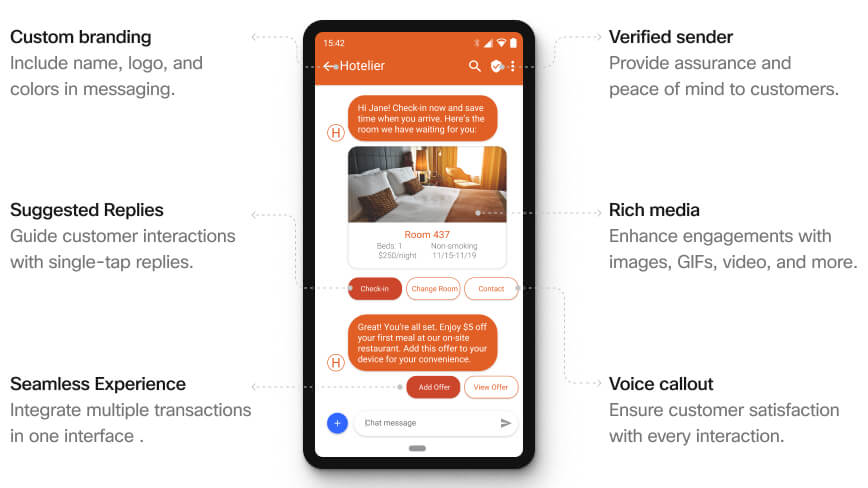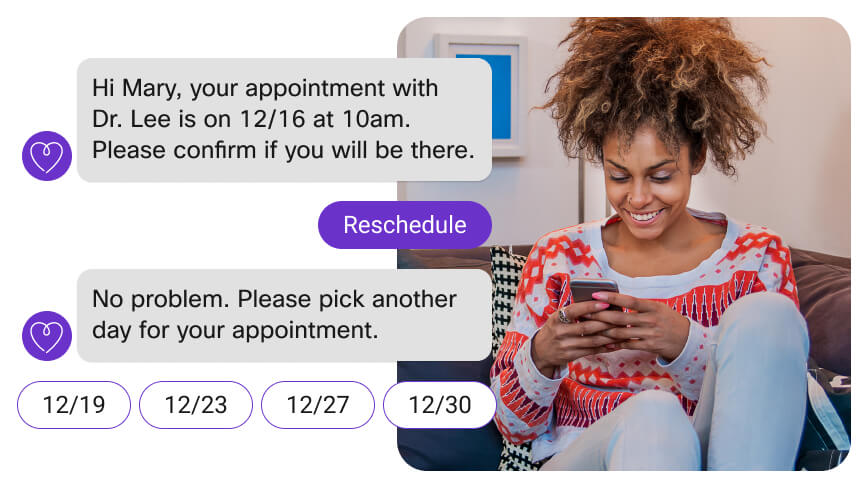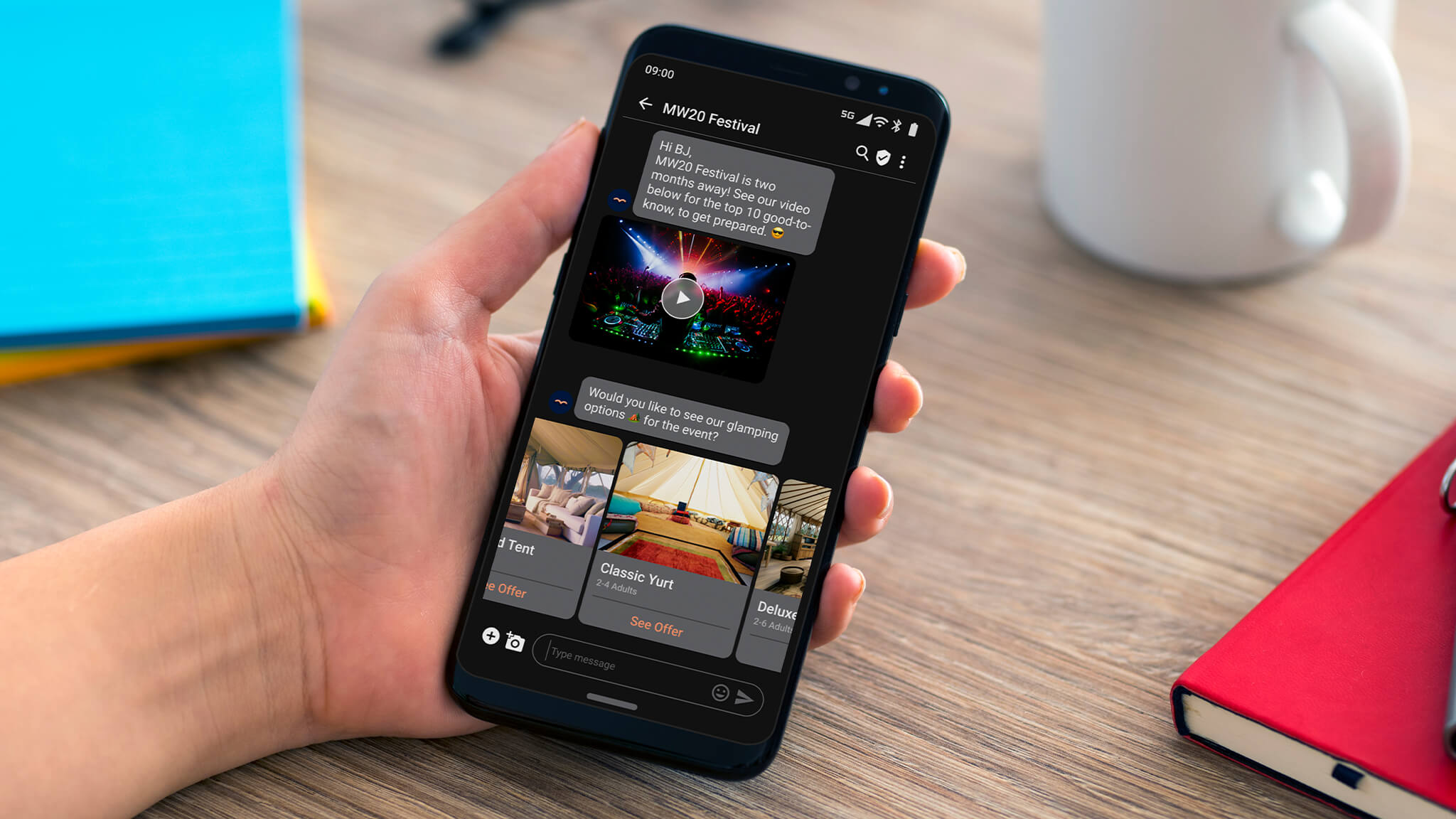RCS explained: Answering commonly asked questions.
Why is RCS so valuable for businesses? And what can you achieve with it? We answer these questions and more in this FAQ guide.

Contents
As they look for ways to build competitive advantage by forming stronger connections with customers, more and more businesses are getting on board with Rich Communication Services (RCS).
RCS enables brands to have more engaging, relevant, and frictionless conversations with customers in a channel that’s native to their mobile device—no app to download, no learning curve. And with the reach of RCS now expanding beyond its Android user base onto iPhones, there’s never been a better time to get started.
To help you understand the what, why, and how of RCS, here’s a rundown of the questions we get asked most often.
What is RCS?
RCS is an evolution of SMS that offers a superior communications experience while retaining the accessibility of a device-native messaging protocol. RCS Business Messaging (RBM) enables the sharing of high-resolution media, such as carousels and cards, that enhance engagement. Suggested replies and contextual action buttons simplify conversations, allowing people to tap rather than type through a conversation.

Most importantly for business-to-consumer communications, RBM messages are branded and verified, so customers know they’re interacting with a legitimate sender. And read receipts and typing indicators help support real-time conversations.
What is RBM?
RCS Business Messaging (RBM) is a term to describe businesses communicating with customers through the RCS channel.
With the enhanced functionality and security offered by RCS messaging, RBM helps organizations elevate customer conversations to increase engagement.
For example, the debt resolution agency OneSource increased message read rates from 59% with SMS to 92% with RBM. Not only that, but proactive RCS reminders that facilitate payments within the same channel helped OneSource improve payment rates by 30%.
How can RBM benefit businesses?
RCS offers numerous business benefits, including:
Greater customer engagement, with rich media and interactive components, and convenient integration with other apps, such as online banking
Higher conversion rates, with suggested replies and actions guiding customers through interactions and turning more browsers into buyers
Increased trust, with end-to-end encryption, branded messages, and verified sender checkmarks helping protect customers from fraud
Cost-saving efficiencies, with proactive reminders, automated conversations, and RCS chatbots resolving more customer inquiries
What are some RBM use cases?
RBM is all about improving how businesses communicate with their customers. That makes it perfect for activities that require direct customer engagement, such as promotional marketing. For instance, businesses can share vouchers with customers through RCS that they can redeem instantly in-channel or save to a digital wallet by tapping a button.
RBM is also an ideal channel for proactively sending interactive updates and reminders that let customers respond in-channel. For example, a hospital could send automated appointment reminders through RBM, with action buttons for patients to confirm, cancel, or rearrange their visit, helping minimize costly no-shows and optimize clinic schedules.

Another high-value use case is integrating intelligent chatbots with RBM to provide personalized self-service experiences that let customers find answers to common questions or complete routine transactions like updating account details.
In fact, almost any digital customer engagement can be enhanced with RBM. Find some great industry-specific RCS messaging examples here.
What kinds of analytics and reporting does RCS have?
RCS offers significant advantages over SMS in terms of measuring success and improving performance across marketing, sales, and service.
For example, read receipts show when customers are opening and reading messages, helping businesses understand the best times to send campaigns. Advanced messaging analytics in RCS also provide deeper insights into customer habits and preferences by monitoring how customers engage with messages and content, and the paths they take through RCS conversations. This gives businesses a comprehensive view of what works and what doesn't, allowing them to create more personalized experiences, improve customer satisfaction, and improve engagement through data-driven decisions.
Can RBM integrate with existing systems?
RBM can be connected to backend systems through various approaches. Pre-built APIs allow businesses to add RBM to their existing communication apps, enabling basic functionality. For a more comprehensive solution, a Communications Platform as a Service (CPaaS) solution can act as a customer journey orchestration layer, integrating RCS with multiple engagement channels and systems such as CRM, agent desktops, dispatch schedules, appointment management, and more.
Is RCS secure?
RCS offers several upgrades in security over SMS. Branded components and verified sender checkmarks provide additional peace of mind, reassuring customers that messages are authentic.
For example, Southwark Council, a local authority in the UK, uses RCS to combat phishing and other scams, helping build trust in the community it serves—with 90% of customers saying they feel reassured and better supported.
As well as the built-in security features of RCS, businesses that choose an RCS provider with a resilient Tier 1 network also ensure messages take the fastest, most secure route to their intended recipients.
Is RCS supported on both Android and iPhone?
RCS has been a native feature on Google Messages on Android devices since 2016, and with Apple’s iOS 18 update in September 2024, it’s now available on iPhones too.*
With RCS available across the global mobile device ecosystem, businesses have an opportunity to offer engaging, interactive messaging experiences to more customers than ever before.
What kind of reach does RCS have?
0M
Potential new RCS users
Google estimates that RCS has 1 billion monthly active users on Android devices, and analysts expect Apple’s support for RCS to add 900 million users to that figure. It’s also important to remember that RCS messages will fallback to SMS for customers who haven’t activated RCS on their device.
With RCS natively available on billions of devices worldwide, it’s set to become the messaging channel of choice for businesses that want to extend the reach and impact of their campaigns and serve more customers more effectively and efficiently.
Get more from RCS with Webex Connect
We’ve been leading the way in developing RCS functionality for more than six years, working with mobile communications organizations like the GSMA to revolutionize business messaging. In that time, we’ve also helped leading brands deploy award-winning customer experiences using RCS on Webex Connect, our CPaaS platform.
To learn more about how you can use Webex Connect to deliver more engaging and secure customer experiences get in touch.



